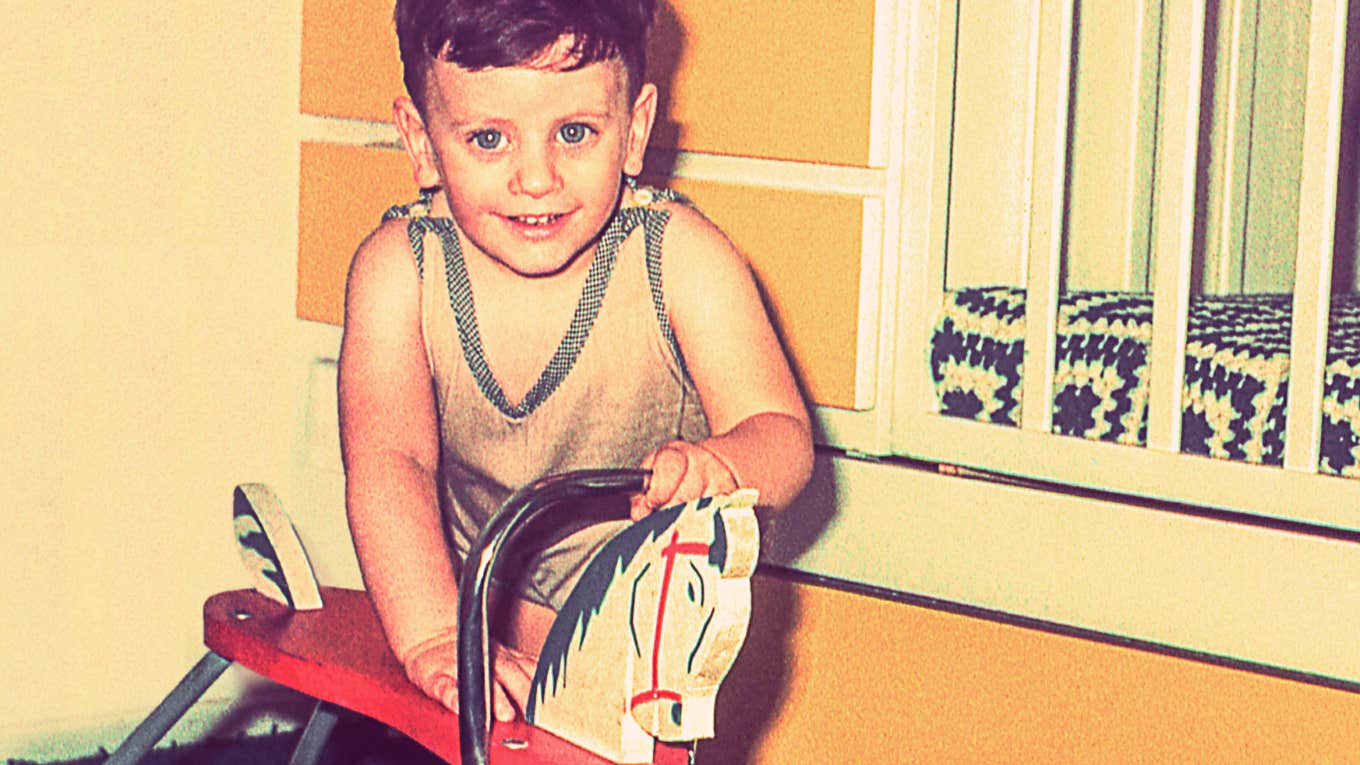11 Reasons 80s & 90s Kids Had Way More Grit & Determination Than Children Today
Back in the 80s and 90s, kids grew up without the distracting world of technology we send children into head first these days.
 Shanina from Getty Images via Canva
Shanina from Getty Images via Canva If you grew up during the 80s and 90s (you know, way back in the 1900s), not only was your childhood vastly different from the way kids are living today, but society as a whole functioned in a way that required more resilience and hard work of pretty much everyone. Kids during that time were brought up before the era of smartphones, social media, and instant access to almost anything you can think of. Instead, they had to really work for things and engage in the world in a way that taught them the value of independence.
Trying to navigate life in today's hyper-connected digital world means that today's kids have been robbed of many foundational experiences. Because there was so much more both expected and required of them, 80s and 90s kids had way more grit and determination than children do today. They were not only able to develop skills without leaning on the internet for support, but they gained a true sense of responsibility, which helped them tremendously as they transitioned into adulthood.
Here are 11 reasons 80s and 90s kids had way more grit and determination than children today
1. Instant gratification wasn't the norm
 Irina WS | Shutterstock
Irina WS | Shutterstock
Kids during the 80s and 90s had to learn the importance of having patience because information wasn't as easily accessible as it is for children today. Research has shown that children who develop delayed gratification usually end up performing better academically, are better at emotionally regulating themselves, and have greater perseverance when faced with challenges.
Kids during that time had to really stick with things and learn that sometimes the only way out is through. They learned that there is true value in not only waiting for things, but also in working towards getting something without seeing immediate results.
2. They learned that rejection and failure are a part of life
 PeopleImages.com - Yuri A | Shutterstock
PeopleImages.com - Yuri A | Shutterstock
For kids growing up in the 80s and 90s, it wasn't uncommon to experience setbacks and challenges that might have made it hard to achieve their goals. Unlike today, when children may experience more cushioning and are able to avoid failure and rejection, children in earlier generations were taught that things like that were just a part of life.
"When children are rejection sensitive, they might worry and become withdrawn or feel angry and become hostile. If they’re trying to fit in and not get rejected, they might learn to conform, ingratiate themselves or be less assertive. Rejection sensitivity is also a good predictor of depression, even before the onset of symptoms," explained Michele Lease, a professor of educational psychology.
While it may seem like a good approach to try and shield kids from having to experience the negative emotions that come from being rejected and failing, it's sometimes inevitable. Once a child learns how to properly address both rejection and failure, they're able to develop better tools to help them in the long-run, especially once they become adults.
3. They had to entertain themselves
 ORION PRODUCTION | Shutterstock
ORION PRODUCTION | Shutterstock
Unlike children today, who, on average, spend an estimated 4-6 hours a day watching or using screens, kids raised during the 80s and 90s had to entertain themselves. Whether that meant playing outside with the other neighborhood kids or coming up with silly games and activities to pass the time in bad weather, 80s and 90s kids had to rely on their imagination and creativity to pass the time.
Back then, kids had to think outside of the box, and that kind of creative thinking became second nature. The ability to entertain yourself is something that can create a deeper sense of self and create a generation of kids who learn how to become self-sufficient.
4. They had to make friends in real life
 A3pfamily | Shutterstock
A3pfamily | Shutterstock
In the 80s and 90s, friendships were made through face-to-face interactions. Whether it was through meeting at school, meeting at the local playground, or being introduced through your parents, kids during that time learned the importance of building real connections.
Kids in today's society are able to make virtual friends without even having to meet face-to-face anymore, and while that might be beneficial in some ways, it's also made it easier to avoid learning the complex emotional skills that come with interacting in real life.
It's been found that kids forming friendships has a significant impact on their lives and can even be the buffer or protective factor for some who may experience turmoil at home or at school. Kids are able to develop a deeper sense of what it means to form an authentic relationship, even at a young age.
5. They had to save for what they wanted
 Ground Picture | Shutterstock
Ground Picture | Shutterstock
For kids who grew up in the 80s and 90s, getting something they really wanted required them to save up their money instead of depending on their parents to swipe their cards and buy it for them. Teaching kids about how to handle money, especially when it comes to saving, helps them become more financially independent as they get older.
Financial education has been linked to lower debt levels, higher savings, and higher credit scores as kids mature into adulthood. Kids during those times also learned the lesson that value comes from real effort. Saving wasn't just about being able to buy things, but also building character.
6. They had more responsibilities at a younger age
 Maria Sbytova | Shutterstock
Maria Sbytova | Shutterstock
Back in the 80s and 90s, it was rare for parents to keep their kids on a tight leash. Children were able to walk home from school at a young age, played outside until the streetlights came on, and went back-and-forth from their homes to their friends' houses without parental supervision. This meant they learned the value of being responsible.
"Helping children develop a sense of confidence and empowerment can help prepare them to make safer and healthier decisions in their lives," suggested marriage and family therapist David Schwartz.
Kids were able to manage their time, even if it was something like having to complete their chores at home before going out. They were trusted with more things than kids nowadays may ever experience.
7. When they made plans, they actually kept them
 Monkey Business Images | Shutterstock
Monkey Business Images | Shutterstock
During the 80s and 90s, when kids made plans with each other, there wasn't any of that last-minute texting to cancel. Instead, they made sure to show up. Rain or shine, if they said they were going to be somewhere, they meant it. And if something really did come up and they were unable to make a certain playdate or other obligation, they had to be upfront about it and cancel over the phone instead of hiding behind a screen to send a message.
Having to navigate adolescence this way meant kids were taught the value of open communication and maturity. They understood that their words and commitment had value, and they couldn't just throw it away without having to deal with repercussions.
8. They weren't subjected to constant comparisons
 Ground Picture | Shutterstock
Ground Picture | Shutterstock
One of the main reasons 80s and 90s kids had more grit and determination than children today is that they weren't exposed to things that made them constantly compare their lives to others. Back then, kids weren't bombarded with content showing how other people are living, and they weren't taught to measure their worth based on likes, comments, and shares.
Kids back then were able to simply live their life without the burden of comparison culture. They were able to understand that their path in life was unique to them and didn't have to be the same as anyone else's.
9. School projects required actual research
 Ann in the uk | Shutterstock
Ann in the uk | Shutterstock
Kids raised during the 80s and 90s didn't have ChatGPT or other technological advances that made doing homework exponentially easier. Instead, kids were forced to sit in the library for hours while they did research on whatever topic their assignment was on. They didn't have the luxury of having access to instant search engines or digital articles.
This gave them a sense of determination to make sure that they found the appropriate sources for an assignment. After all, their entire grade depended on it. Without shortcuts and instant answers, kids during that time were taught the valuable lesson that hard work and persistence was the key to succeeding.
10. If they want to talk to their friends, they had to speak with their parents
 MIA Studio | Shutterstock
MIA Studio | Shutterstock
In the 80s and 90s, if a child wanted to make plans with their friends or talk to them on the phone, having a quick conversation with that friend's parents was pretty much unavoidable. Because children didn't have access to cell phones when they were young during that time, calling the family landline was the only option. This meant that from a young age, kids during this time were not only learning the value of communication, but also the importance of respect when talking to adults.
Today, kids rarely have to experience that. Those kinds of skills may seem trivial to some people, but in reality, learning how to converse with adults helps develop emotional skills that are important for when kids eventually become adults themselves.
11. They had to remember everything
 theshots.co | Shutterstock
theshots.co | Shutterstock
During the 80s and 90s, kids didn't have the luxury of putting things in the calendar app on their phones or set digital reminders. Instead, they either had to write it down and stick it to the fridge or simply rely on their own memories. This meant kids during that time were had to understand the importance of not only time management, but personal accountability as well.
They needed to engage their brains and keep multiple pieces of information stored in their minds. This now-old-fashioned way of doing things had the ability to really strengthen their cognitive abilities, and thus, helped them immensely as they grew up.
Nia Tipton is a staff writer with a bachelor's degree in creative writing and journalism who covers news and lifestyle topics that focus on psychology, relationships, and the human experience.

